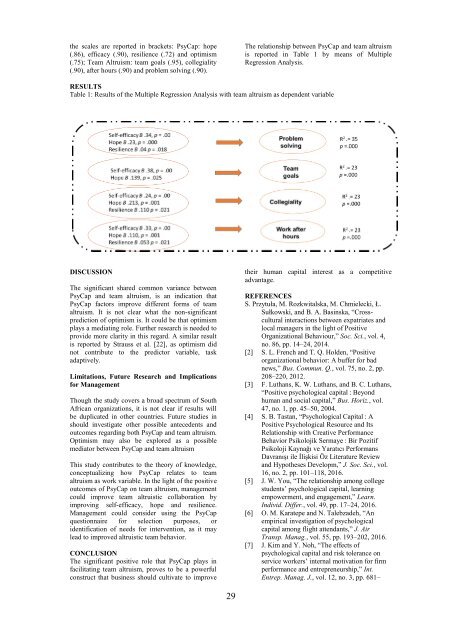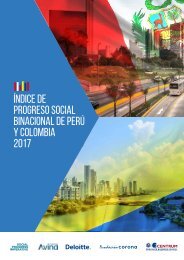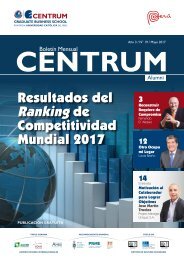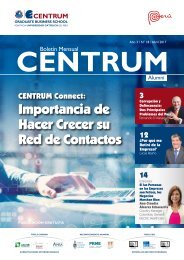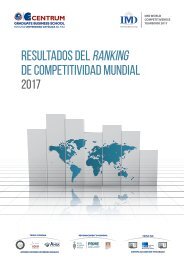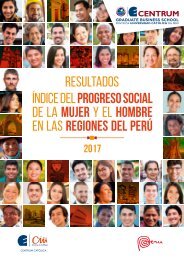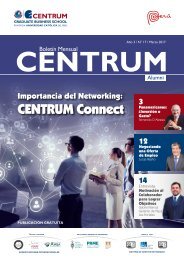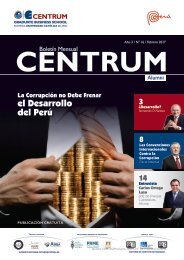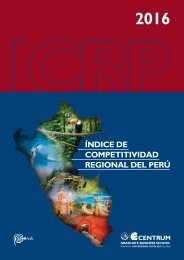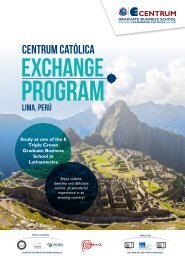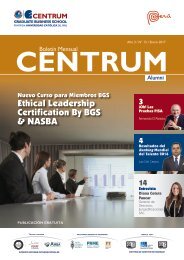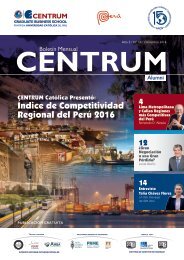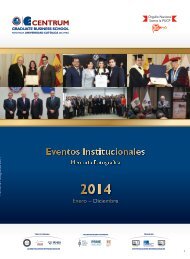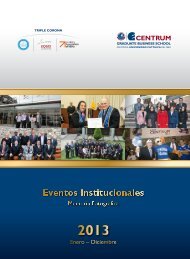Pan-Pacific Conference XXXIV. Designing New Business Models in Developing Economies
This publication represents the Proceedings of the 34th Annual Pan-Pacific Conference being held in Lima, Peru May 29-31, 2017. The Pan-Pacific Conference has served as an important forum for the exchange of ideas and information for promoting understanding and cooperation among the peoples of the world since 1984. Last year, we had a memorable conference in Miri, Malaysia, in cooperation with Curtin University Sarawak, under the theme of “Building a Smart Society through Innovation and Co-creation.” Professor Pauline Ho served as Chair of the Local Organizing Committee, with strong leadership support of Pro Vice-Chancellor Professor Jim Mienczakowski and Dean Jonathan Winterton.
This publication represents the Proceedings of the 34th Annual Pan-Pacific Conference being held in Lima, Peru May 29-31, 2017. The Pan-Pacific Conference has served as an important forum for the exchange of ideas and information for promoting understanding and cooperation among the peoples of the world since 1984. Last year, we had a memorable conference in Miri, Malaysia, in cooperation with Curtin University Sarawak, under the theme of “Building a Smart Society through Innovation and Co-creation.” Professor Pauline Ho served as Chair of the Local Organizing Committee, with strong leadership support of Pro Vice-Chancellor Professor Jim Mienczakowski and Dean Jonathan Winterton.
Create successful ePaper yourself
Turn your PDF publications into a flip-book with our unique Google optimized e-Paper software.
the scales are reported <strong>in</strong> brackets: PsyCap: hope<br />
(.86), efficacy (.90), resilience (.72) and optimism<br />
(.75); Team Altruism: team goals (.95), collegiality<br />
(.90), after hours (.90) and problem solv<strong>in</strong>g (.90).<br />
The relationship between PsyCap and team altruism<br />
is reported <strong>in</strong> Table 1 by means of Multiple<br />
Regression Analysis.<br />
RESULTS<br />
Table 1: Results of the Multiple Regression Analysis with team altruism as dependent variable<br />
DISCUSSION<br />
The significant shared common variance between<br />
PsyCap and team altruism, is an <strong>in</strong>dication that<br />
PsyCap factors improve different forms of team<br />
altruism. It is not clear what the non-significant<br />
prediction of optimism is. It could be that optimism<br />
plays a mediat<strong>in</strong>g role. Further research is needed to<br />
provide more clarity <strong>in</strong> this regard. A similar result<br />
is reported by Strauss et al. [22], as optimism did<br />
not contribute to the predictor variable, task<br />
adaptively.<br />
Limitations, Future Research and Implications<br />
for Management<br />
Though the study covers a broad spectrum of South<br />
African organizations, it is not clear if results will<br />
be duplicated <strong>in</strong> other countries. Future studies <strong>in</strong><br />
should <strong>in</strong>vestigate other possible antecedents and<br />
outcomes regard<strong>in</strong>g both PsyCap and team altruism.<br />
Optimism may also be explored as a possible<br />
mediator between PsyCap and team altruism<br />
This study contributes to the theory of knowledge,<br />
conceptualiz<strong>in</strong>g how PsyCap relates to team<br />
altruism as work variable. In the light of the positive<br />
outcomes of PsyCap on team altruism, management<br />
could improve team altruistic collaboration by<br />
improv<strong>in</strong>g self-efficacy, hope and resilience.<br />
Management could consider us<strong>in</strong>g the PsyCap<br />
questionnaire for selection purposes, or<br />
identification of needs for <strong>in</strong>tervention, as it may<br />
lead to improved altruistic team behavior.<br />
CONCLUSION<br />
The significant positive role that PsyCap plays <strong>in</strong><br />
facilitat<strong>in</strong>g team altruism, proves to be a powerful<br />
construct that bus<strong>in</strong>ess should cultivate to improve<br />
their human capital <strong>in</strong>terest as a competitive<br />
advantage.<br />
REFERENCES<br />
S. Przytuła, M. Rozkwitalska, M. Chmielecki, Ł.<br />
Sułkowski, and B. A. Bas<strong>in</strong>ska, “Crosscultural<br />
<strong>in</strong>teractions between expatriates and<br />
local managers <strong>in</strong> the light of Positive<br />
Organizational Behaviour,” Soc. Sci., vol. 4,<br />
no. 86, pp. 14–24, 2014.<br />
[2] S. L. French and T. Q. Holden, “Positive<br />
organizational behavior: A buffer for bad<br />
news,” Bus. Commun. Q., vol. 75, no. 2, pp.<br />
208–220, 2012.<br />
[3] F. Luthans, K. W. Luthans, and B. C. Luthans,<br />
“Positive psychological capital : Beyond<br />
human and social capital,” Bus. Horiz., vol.<br />
47, no. 1, pp. 45–50, 2004.<br />
[4] S. B. Tastan, “Psychological Capital : A<br />
Positive Psychological Resource and Its<br />
Relationship with Creative Performance<br />
Behavior Psikolojik Sermaye : Bir Pozitif<br />
Psikoloji Kaynağı ve Yaratıcı Performans<br />
Davranışı ile İlişkisi Öz Literature Review<br />
and Hypotheses Developm,” J. Soc. Sci., vol.<br />
16, no. 2, pp. 101–118, 2016.<br />
[5] J. W. You, “The relationship among college<br />
students’ psychological capital, learn<strong>in</strong>g<br />
empowerment, and engagement,” Learn.<br />
Individ. Differ., vol. 49, pp. 17–24, 2016.<br />
[6] O. M. Karatepe and N. Talebzadeh, “An<br />
empirical <strong>in</strong>vestigation of psychological<br />
capital among flight attendants,” J. Air<br />
Transp. Manag., vol. 55, pp. 193–202, 2016.<br />
[7] J. Kim and Y. Noh, “The effects of<br />
psychological capital and risk tolerance on<br />
service workers’ <strong>in</strong>ternal motivation for firm<br />
performance and entrepreneurship,” Int.<br />
Entrep. Manag. J., vol. 12, no. 3, pp. 681–<br />
29


